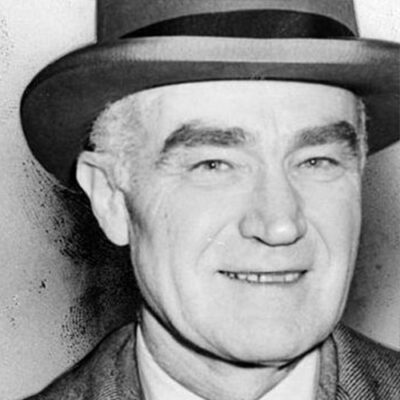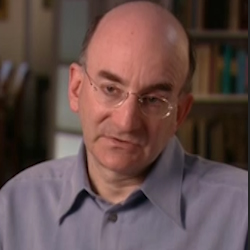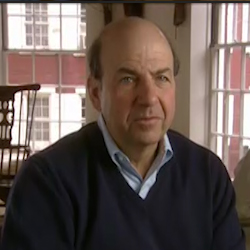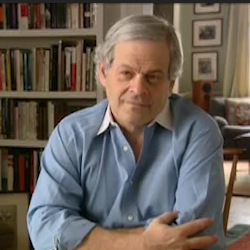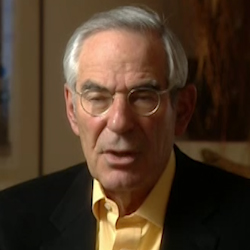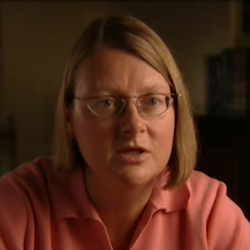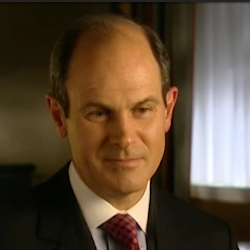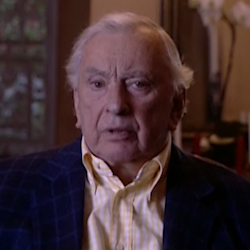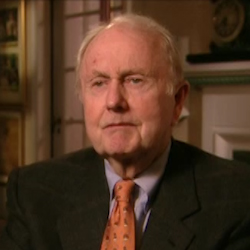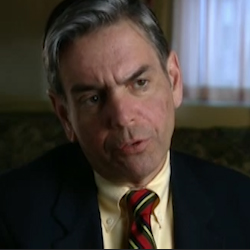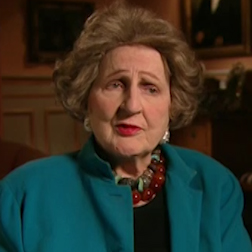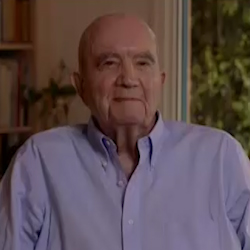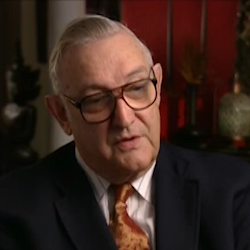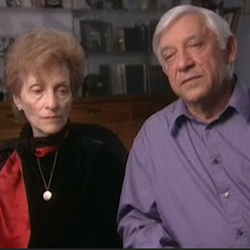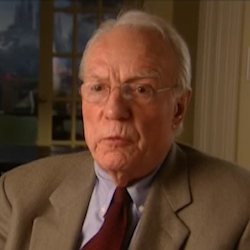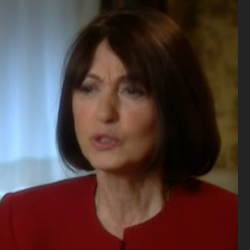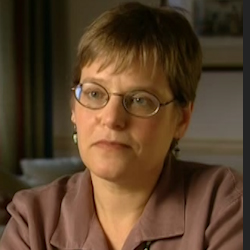Speaker That’s right.
Speaker Because is my son. My my tiger’s younger brother, who. The Tokyo bureau chief. 50 years after I was.
Speaker He’s right.
Speaker He lives in Boca. He’s writing the big book on you. He quit time me the other day because he got a huge contract with a book on the big book and AOL Time Warner. Oh, really? Yeah, he was Time’s international business expert.
Speaker Before that, touches crossed the story again.
Speaker Yeah, yeah, yeah. DRASH Crazy interview.
Speaker OK. OK. So I just want to say that this is. Today is January 24th, and we’re interviewing Frank Gibney and this is the first tape of this interview for Lewis in the making of the American Century. When you were younger and life was. Life magazine was first coming out. Was it something new and different and exciting?
Speaker Yes, life was a bolt from the blue, really. No one had ever thought of the picture magazine in that way before. It had lots of imitators, but it done only set itself up as the picture magazine when it developed a style and a way of talking of its own. So it was a new thing, although at the time which came out, I was working full time. We never paid much attention to like.
Speaker What was what was new and different about it?
Speaker Well, of course, that that was that it was it was weekly journalism and the idea of going behind the scenes and showing what kind of breakfast food the great statesman had in the morning and before he went to work and how long it took him to get there. And of course, the magazine of opinion that was made is so different from many. And if you happen to agree with times opinions, you were very comfortable writing there, even if you weren’t. And the time business time editorial department was always a nest of latent rebellion. You get along with them well, because it was very well-run organism and they rewarded merit.
Speaker When you mentioned the thing about what the great states would have for breakfast. Was that stuff made up?
Speaker Oh, no, no. You had to get people the time the first time in those days was was divided according to what now would be called gender relationships, the males, whether the writers of the women or the researchers. And there was a very tough research team headed by a lady with extruding name of content, Peckham. And researchers were urged to go over literally every word of a story. So if you if you said it was he was having a breakfast on of mice in China, you had to be prepared to show where you got that fact from. To the point where once when I was covering the war in Korea, talking about money wars jammed with tank muddy roads jammed with tanks, I got a query from New York saying, please describe the money in Korea. That was about the Nader. But there you you had to get the facts right now, how you presented the facts was another story.
Speaker Meaning? Meaning that depending on what you were covering, you had a great deal of latitude or no latitude at all.
Speaker I felt sorry for the poor China experts we had because, of course, Harry Luce had this lifelong love affair with Chiang Kai shek. He was a Christian pious methods. I don’t think he ever believed was a believer at all in anything but himself. But Harry’s view of China was inflexible. You had to be before Chiang Kai shek, and it made things very uncomfortable.
Speaker On the other hand, I was I was a local Japan expert. And no one interfered with me as long as I didn’t interfere too much with the worshipful comments about Douglas MacArthur. And that posed a problem.
Speaker But when MacArthur was fired, I was spent a year writing the religion section. There was a problem, too, because time was the only organism that was so heavily officered by believers. You might say there I was writing religion and I had these four or five pairs of eyes scanning every line I wrote for real or fancied bias or error. There was the Tom Matthews, the the editor chief of time was the son of an Episcopal bill. Bishop Harry Luce, of course, was the archetypical American Presbyterian. Roy Alexander, who was the managing editor of TIME, was a good Catholic. His father, his rather his. His brother was the editor of Jesuit Missions, a Jesuit priest. I was a Catholic myself, which ran into problems occasionally when people like the Reverend Bob Jones would come to be interviewed. But in any case, religion was not much interfered with in the normal run of of things in foreign news was played quite straight. But when you got into first the Chiang Kai shek and the China Civil War and then later the draft to make Eisenhower present, you were sailing in very murky waters indeed.
Speaker What do you mean? Yeah. The stuff about getting into murky waters.
Speaker Well, Harry Lewis was one of the people who had actively persuaded Eisenhower to join his crusade for the Republican nomination.
Speaker And Harry felt very strongly about this and mobilized almost everybody he could in his hierarchy to support us now. And at first glance, this was unacceptable. Eisenhower was a man of considerable stature, and you wished him well. The more you found out about Eisenhower’s political views, the less sure you were that he was a good shot for the presidency. But in any case, Harry was wrong for him. Harry had two of his leading employers, c.D Jackson, who was longtime publisher of Life. Before that ran time, International became Eisenhower’s trusted aide and speechwriter. As indeed did Emmett Hughes, who was a time correspondent of some repute. And in fact, Hughes was the guy who can concocted the I will go to Korea pitch for Eisenhower’s campaign, which is one reason why we have all this trouble with North Korea today. The army was quite prepared to go about 20 miles up the Korean Peninsula. But no, I said we have to stop. So we stopped. In any case, as the Eisenhower campaign intensified the pressure to deliver the news the way I can, the Republicans would like it delivered was great. And of course, it wasn’t. You couldn’t say just Republicans because Harry was very anti Taft Republican, too.
Speaker In those days, a sizable group of Republicans were too conservative, even for Eisenhower.
Speaker And of course, it led to a great break with Tom Matthews, who was the supreme editor of Time under Harry and did very well at the job. But Matthews was a liberal Democrat and also a Princeton classmate of Adlai Stevenson.
Speaker Many of us had ties with Stevenson. I had a my wife, former wife’s uncle will let his campaign.
Speaker And in fact, through the SEP 52 campaign, I ran some a little outfit called Overoptimistic with the switch to Stevenson Committee and use my office and time on the days off as our headquarter temporary headquarters. But Harry wouldn’t have like that. And. And after as the as the campaign neared, Dorthea came should a time of election.
Speaker The pressure was really intense.
Speaker And of course, there were the classic story about the cover story about Eisenhower, about Stevenson, which Matthews was satisfied with. And then Lou sent one of his hatchet men into change it. And great acrimony flowed from that.
Speaker Yeah, great story. Yeah.
Speaker Well, as I recall there, just before the election, there were a couple of cover stories about the leading candidates, and no one at a time was too troubled about the Eisenhower thing. S. Eisenhower was already a byword in Carter’s, but there was a lot of trouble about Stephensons because most of the editorial staff were secretly are not pro Stevenson. And so indeed was Thomas Stern’s Matthews, the editor. And so there was a big cover story written about Stevens and Matthews. And Luce quarreled bitterly over this loose, kept sending hatchet men in to who who believed a thousand percent and whatever. Harry was believing that at that moment to write the cover. And then when Matthews is the editor to rewrite it, it ended up flopping around somewhere in the middle. Nobody was satisfied with it. But it led to Matthews departure from time. Matthews resigned later. And Luce respected him. And Jack gave him some grounds to believe that he would be able to start a new edition of Time in London. And there was a lot of shillyshallying with Harry on the business side about that. And finally he turned Mathew’s down on the London project after he left his editorship of Time in New York. There was the classic case of the telegram cable. I guess we still use cable in those days, which Matthews sent to loose following Luce’s decision that there would be no English British edition of Time. And Matthews reply ran. Why did you have me standing on tiptoes so long if you weren’t going to kiss me? So it went.
Speaker Just more detail without going that far.
Speaker But when you say Matthews wrote the cover story or prepared the cover story, then he said his hatchet. Well, what was the difference in the way they were?
Speaker Well, Matthews Matthews Commission, one of the writer, a good writer, wrote the story, which then had to go through a senior editor and senior editor, Sanford, where someone like the late Tom Griffiths would have been very pro Stevenson, although mindful of Luce’s possession. So you had to be sort of cautious in that regard. And and then Ebele finished copy would go to Matthews and Matthews would do what editing he wanted and then release it for it to be published. And then with the case of critical articles like the Eisenhower Steam’s that articles Luce wanted to see everything loose was very discontented with the article that emerged from Matthew’s editorship. And so we said one of his True-Blue followers to rewrite it. And there it followed there, followed writings and rewrite things because given times hierarchical setup, every story had to go through a prescribed sequence with the editor. The writer would edit after the researcher would check it, and then the researcher would check it out again. It would go to the senior editor. The senior editor would either pass it or change it or occasionally set it back. And then it would go to the magic editor or the assistant managing editor. And ultimately, that passed.
Speaker It would go down and into print.
Speaker And everybody had his ideas about how stories should be treated. I remember former editor of my men named Max Wei’s long gone, who is returning a term reward, very bright man who was editor of Foreign News and a kind of what would now be called a neoconservative and met ways always said people say there’s a slant at time. Sure, there’s a slant. I put every slant that I can into it and everybody else puts his slant into it.
Speaker Well, that sounded pretty good. But the whatever slant the writer wanted to put into his story was trumped by the staff slant that the senior official wanted to put into the story. And that, in turn, suffered either approbation or a basement when it got to the managing editor.
Speaker Stevens was the thing about this was it was too favorable, it made him want to go.
Speaker He had really it made him look good by really telling the truth. It was a pretty straight article, but that wasn’t good enough for Lewis because Harry Lewis desperately wanted Eisenhower to win. And I used the word desperately advisedly. And he was the 20th. The two great obsessions of his life. Politically speaking, I thought were Chiang Kai shek and Eisenhower. And with Chiang Kai shek, he was about a thousand percent wrong with Eisenhower. Well, well, history will maybe tell that so. So what? Luce was obsessed with a subject. He would let nothing stand in his way. And that’s. And so he he intervened. And what the normal process of things that time and produced this very slanted view of Adlai Stevenson, which casts considerable doubt on many of Stevenson’s major premises.
Speaker It gives rise to so many things that talk about. So first I go to the beach. Sure, please. There are a lot of. Liberals and yeah, no, Harry was nothing, if not a Republican. Yeah. First of all, why did he are so many liberals?
Speaker And then how did the liberals sort of survive in.
Speaker Well, there are two reasons one. Harry admired quality and quality was what do you want to have to pay? And emoluments were quite good. And you thought twice before you quit time once you been hired? I quit Harry twice as it happened, but that was another story. So he was also a peculiar kind of Republican in the sense that he was, above all, a journalist, journalist and businessman. But as a journalist, he had a very lively curiosity. I mean, the average Republican would not thought of, for example, of doing a cover story about John Courtney Murray, the Jesuit philosopher who really rethought the whole idea of Catholicism in the liberal society. And in many cases, Luce would seek out people and his instincts were generally pretty good.
Speaker So there was a comfort indeed. And knowing that there was a at the top of his organization, there was a journalist, there was someone who, to an extent of thought, the same way you thought and understood your prejudices and concerns. And of course, we compare this. What happens at AOL Time Warner now? Good God, poor Harry is turned over in his grave so many times it isn’t funny. But in any case, in those days, you tie loose, got away with a lot of enforcing of his prejudices because time was was a very good place to work. And to an extent at least, merit was always rewarded. You did well. You’d be promoted and get more money and so on, and you’d be fairly contented and you’d have the famous nebulous time lunches and the classic well-paid time correspondents in those days. You’re always confident that you’d go first class? I remember the the Korean War, my trenchcoat was stolen and Sembler. And so there was great Judoon Carter Cable correspondents telling the New York office exactly what type of a trench coat I wanted them by. And Abercrombie’s before that, when I’d gone out to Tokyo to run the bureau, I’d forgotten my squash racket in New York. So there there’s more correspondence ensued with the requisite or Elizabet. Time to get give me a new squash racket, send it out to Tokyo fast. The only problem was they wanted a squash courts in Tokyo.
Speaker So how how how difficult was it for.
Speaker A writer to. Or really write his story and then watch it go through.
Speaker Well, sometimes it was seriously violated.
Speaker And of course, remember that people are here. My questions.
Speaker Oh, yeah, OK. Yeah.
Speaker At its worst, the slant on writing would drive people over the brink. For example, Cornelius Ryan, who later wrote The Bridge Too Far and all those good war novels had said covered the war in Palestine, the independence of Israel before he was hired by time. And he would write the war story as it as he thought it looked and has a dead look. But whatever. One of O’Brien’s manuscripts went into Whittaker Chambers, who was then his senior editor, Chambers would call it a researcher named Rena Grossman, whose father was the head of the world Zionist, and they’d change the copy. Things like this would happen.
Speaker Another lifted. On the other hand, some people exaggerated this one. One writer I know shared an office with was terribly concerned about what the topic Raccah time was thinking. And he got he got one day a week article in which an editor had written some cautionary words at the top of the editor, a top of the Skies manuscript.
Speaker Yet he had written. Once more into the breach, under the breach, once more. And the writer, Sam, the writer, came to me and said, Look, Frank, what’s this mean about breach? Is this a new line? I said, no. It just says you have to write it over. On the other hand, if there if there was a topic in which a writer had good interest and which she could defend, it had an excellent chance of being printed. I even wrote editorials later in life for Harry Luce and the ones that had the most imagination and the most drive ultimately were permitted.
Speaker So you always knew in a way that barring the excessive prejudice for Chiang Kai shek or Dwight D. Eisenhower, if you had a good case and defended it, you’re apt to get it through. And this hope, what’s the soften and realized? Kept a lot of people working for time in those days in the 50s was a very happy shop.
Speaker Let’s talk about.
Speaker The obsession with with Channing and even go back as far as to talk about the. The famous there was no conflict between tell me why. Yeah.
Speaker Well, Teddy White, of course, started as a stringer for time doing stories on the side.
Speaker And he’d come out to China, really fresh from Harvard and studied Chinese, knew the country and was quickly hired staff. And then he he got along pretty well in the days with Chongqing, because when I was a period after all of the early part of World War Two, when John Kai-Shek was highly regarded by all Americans as another of the standard bearers of democracy. And of course, Mrs. Madam Chiang came over to Washington and made her a memorable speech. And, you know, how could she go wrong? Good God, she was she she was pretty. And a Methodist, too. What a combination for a Chinese. And she was that she was what Americans hope to hope to would come as a result of putting setting those mission packets to China and Sunday school for years.
Speaker Well, it took a while for people to realize that that Chiang Kai shek was not a shining knight in shining armor and nor was the lady. But in the early days when you were just reporting the battles and and the struggles against the Japanese, there were no rents in that garment. But then as as Teddy White, as it as did most of the correspondents then became aware of the terrible corruption and Chiang Kai Scheck’s regime and of Chiang Kai Scheck’s deadly authoritarian tendencies. He began to write stories that bothered loose and loose would come out, and he time and time again in he ordained that a cover story on Chiang Kai shek be published in the weekly newsmagazine. And one was Gusher, then the other. And he had a couple of people working on that who more or less made a specialty. There were there were quite a few people in a time who were alert to what they thought, how his views were and did their best to fulfill them. They were minority, though.
Speaker In fact, I always thought in a good commentary on some fairness that our dissection of that of the two correspondents I knew who covered the civil war in China, one who most slavishly tried to produce Luce’s viewpoint, really didn’t do too well. And the magazine finally left the other, who told it like it was and suffered a bit for it was ultimately promoted and became the editor of Life International. So there was a of that kind of fairness. But in the case of Chiang Kai shek, fairness went out the window. And the only reason I lasted so long as a foreign news writer or correspondent was that my area was Japan, about which Harry Luce felt not so strongly.
Speaker But what happened with Harry?
Speaker Well, Harry. Harry. They’re there that Harry tried to convert Teddy and Teddy tried to convert Harry. In a sense, both efforts were conspicuous failures. And Harry was very reluctant to let it. In fact, he offered any other jobs, in fact.
Speaker I think if he had been willing to take over the TIME bureau in Stockholm or something like that, he would have stayed with the company.
Speaker But Teddy stuck to his guns about China. And of course, his book, which he wrote with Emily Jacoby later recently died.
Speaker Thunder Out of China was the great exposé of the Chiang Kai-Shek regime, and that went down badly with Harry. So the when the breach when it finally came, what it was was not a happy one. There was a good bit of mutual respect there. And Harry was very sorry to lose Teddy White at the same time. He thought he was wrong. And tell me why. Whose convictions were even stronger. Harry knew Harry Luce was wrong. And so there was.
Speaker What was the upshot or the effect of Luce’s obsession with China with regard to once the revolution succeeded? And there was a lot of. Oh, yeah.
Speaker Oh, yes. Well, lose, lose, lose did not join the pack yelling with McCarthy that all the people who reported fairly on China state should be thrown out a looser standard. McCarthy was pretty good. He broke with general Republican orthodoxy there, too. On the other hand, he thought that people who presented the communist Yanan in apparently favorable light were just wrong.
Speaker They had to be wrong because Chiang Kai shek was right and there with Harry Luce. There was a kind of theological fervor in his support of Charn. But I do think that that most of the people who reported fairly in the state of our word were not treated badly in time.
Speaker So because, again, it depends who you speak to. Halberstam felt that Luce was instrumental in the kind of who lost China. Purges. Not that he was problem Carthy. I mean, I think no. But but. There are some who feel like Harry Luce was, uh, was.
Speaker Central, yes, with with with Harry, the phrase who lost China resonates because, once again, he was literally unable to admit that there was anything really bad about Chiang Kai shek. And this even covered his Stillwell’s argument with Chung. So so after Chang lost and went back to Formosa, the time was full of happy, hopefully happy articles showing Chiang Kai shek its fierce army with Baynard Practice just ready to go back and to the mainland and kill all those communists. Do it somehow by foul means, ejected them. And this was the idea in time throughout. And so while the rest of the magazine one felt, do a pretty good job in reporting, time was like a huge fairy story where the State Department and unseen monsters were the ogres and Chiang Kai shek and with Mrs. Chang, of course, were locked inside the castle. And it was a bad it was a bad, bad thing. It was a if there’s one really blot, big blot on our lives is reputation. It’s his colleague of Chiang Kai shek and the fallout. It didn’t matter whether Time personally denounced some State Department fellow or not. But if there was an article point out who lost China and that it was these liberals who like that this was good fodder for the McCarthy ites and for that matter, John Foster Dulles, who will go into history as the man who totally betrayed his office by doing nothing to oppose the firing and crucifixion, really, of 70 people who were just reporting China fairly in the in those days of the 50s.
Speaker Prime minister.
Speaker Airport in Geneva.
Speaker All right.
Speaker Well, Harry Lewis was was, to put it mildly, an activist, if he wanted to go someplace, you want to get there fast and buy the most expeditious way. And he would he hated to wait. And there was a story which could be apocryphal. But I’ve always thought read true to the man that he was with the usual senior time correspondent somewhere in Europe. Let’s say the airport at Syracuse, the airport was fogged in. They wanted to go say to Spain, France, Madrid’s sorry, Harry. That just stopped flights, canceled flights, cancel. Well, where are they going? Where are they going? Well, there’s a flight to Stockholm.
Speaker Okay, let’s go to Stockholm. That was more or less Lucy’s way of doing thing. And of course, no one was going to Don was going to deny it because there was no question the fact that he was the boss.
Speaker I remember the very junior member of the London bureau. Harry came over to have a little talk to the people. His correspondence, which was generally very hortatory and involved Harry talking and others listening, whereas the bureau chief, who was a sycophant of his, would stop every 10, 15 minutes to say, well, it is mellifluous Southern accent.
Speaker He said, we’ll have enough now as as reported. Ed, let me ask you something. Is that the usual question which Harry could best out until there was the talk, which was overlord’s? I think it Claridges or one of those fleshpots went on and on and everyone sat there. Luce was talking and continue to talk. And his helpful bureau chief kept saying, Harry, as a as a reporter to editor. Harry at home. Yes. I’ll tell you as one hour, two hours. Three hours. Finally, the man named Eric Gibbs who entered DOT, the only man he guts in the bureau, got up and said, excuse me, Mr Lewis, I have to go to the men’s room.
Speaker It was no one else had the courage to walk out. And this was not a lose.
Speaker It was the fact that an aura was created around him and that at the time, my former wife named Harriet Harry, she was known as Harry. And I’d be going into the crowded time elevator in the morning or the lodge and say casually without thinking what I was saying to my interlocutor.
Speaker You know, I told Harry this at breakfast today and it was very complex. Issue of 15 pairs of ears began to flap. Harry, it had to be Harry Lewis. Good God is giving me getting that close to him. Why did why didn’t he go to the senior editor?
Speaker There was another classic moment when Harry had come back from one of his many trips to Europe and had been suitably impressed by the evening, the opera, La Scala, Milano. So they talk range to that.
Speaker And Harry would say, yeah, you know, NASCAR’s great, great, great, great story. SHROYER La Scala scores. Great, marvelous. The opera is a sense of belonging sort of being there. Wonderful thing. One of my friends, men named Marvin Barat, who later became head of the Columbia School of Journalism, was out of the back of book writers and half the story. And he said, Well, Harry, Mr Luce, what opera did you see? And he said, Well, that’s funny, isn’t it? What opera? Well, I really escaped my mind and vote. Poor, poor modelling kicked heavily by all the senior editors under the table.
Speaker No, no. Don’t know. Well, yeah. Yes, I was very good. Let’s go. I was very good. End of end of story. But there was that that aura of sanctity around the proprietor, which was hard to shake.
Speaker On the other hand, in many ways he was an unpretentious man. But he knew what he had. He knew what he did.
Speaker And one of his worst moments came after the successful election of his protegé as he thought Dwight Eisenhower, when he had a big gathering for the editorial staff of time at one of the fancy clubs in New York. I forget which one. And it was a very good dinner and we had a lot to drink. And and then Harry got up and pointed out that there were a lot of people who objected to the way time had covered the election and the new presidency. And he said, I do not remember the exact words. He said, that’s too bad because it’s my magazine. I’m the man who said I’m right. And there was a hush over the assemblage. The only comparison I could make to that was the time that. Friend of mine, a Communist Party boss in China, many years later, had said that if anyone their district were to disagree with dung shopping, he should step out now and mentioned it. The reaction was quite the same.
Speaker And this caused a lot of ill feeling. I was very happy at the time because I was going to Newsweek and after so many years at a time, I felt it was better to get a little fresh air. And so that was his worst side when he was defending himself. And he is a know effect by God. It’s my magazine and I do what I want. And so all that veneer suddenly disappeared in a matter of seconds.
Speaker OK. Yeah. So what was his best quality?
Speaker Was his curiosity. And he would follow that almost as as far as it took if he found someone interesting. We found an interesting movement. He would pursue it and it would get the magazine working on it. Now, we’ve got to give a good example. Not from time, but from life.
Speaker At one point after I fled across the ice from Newsweek, returned to life, I was asked to write of a series of stories about crime in America and all good journalists as we are. All the editors got together and said, well, actually, from the one one chapter on the gangs, one chapter on prison, one chapter on murders.
Speaker And they laid out the whole schmear for loose and loose, looked at it and said, well, what about white collar crime? Isn’t a white collar crime. Pretty bad? You’re coming, right? Why Killara? Well, why.
Speaker Yes. Yes. Eric. We’re thinking about that. How I got white collar crime, you white collar crime.
Speaker And so I was chosen to write these storied white collar crime, which later became a book called The Operators that I wrote quite successfully.
Speaker But it was an example of the fact that he was a man, a very curious man with an editor’s sense for what was news. And he was not he would he would lead like intellectual wordplay, like he was he was in his way of life, sort of half intellectual. If you looked in terms of the prominent Tolkien book now being showing in the films, he was about two thirds Hobbit and one third orc.
Speaker I forgot something. Yeah.
Speaker So and he would he would come in with ideas and transperth them down the line. This is that time. And of course, there was a memorable two weeks a year when Harry would move into the magic editor’s chair himself. And he was good. You were right. I remember once writing rather naively in some article denouncing something the Russians were doing in Moscow. And Harry didn’t touch it except after the word Moscow. He put a little clause that widely regarded as communism’s capital. Let’s. Change the whole point of the story of the whole vector. I’ve made it much better. So we have that capability. But he also had a ADIC journalists and editors feeling for what people wanted. And he made what speech was it? Let’s let’s get a lot of corn in the magazine. What corn losses? Corning. What’s Corney. Popular, popular mass media stuff.
Speaker That’s he like that.
Speaker And that was beyond his founding of life because he was afraid the time was getting a bit too cerebral, I think, along with everything else, and wanted a big, brash, noisy publication that dealt heavily in what we then called corn. And so that’s how life was born.
Speaker I think I have no real inside information regarding his. In his universe, the timing, which for a time, Charles, was time, life and fortunes. Yeah.
Speaker How did he regard these children?
Speaker Well, his heart was always with time. The first born, so to speak. Fortunate interested him because he got all his conservative ideologues to write for a fortune, including a lot of people. Doug. Ken Galbraith started out as a writer for Fortune. So Fortune was Maxted, fairly authoritative. They wrote a great piece in Japan 1937. Were Wild or Archibald MacLeish, one of the distinguished people, Peter Drucker used to write for Fortune. As I recall, he liked life, too.
Speaker But in an in a different way, life was. Life was a puzzle. But his childhood wanted to show business and sense. He was he was best. Best. What he was thinking about time at the same time, time brought out the worst in him. Because if he had an opinion by heaven, he wanted that opinion produced.
Speaker And so it so it was a letter out, of course. You mentioned Sports Illustrated. He had another impulse that you should have a magazine on Sports Sports Illustrated. Many of his advisers, I believe, disagreed. And Sports Illustrated was proving the advisors right because it made had spectacular losses for years. Ultimately, it made money. And God knows that’s a magazine that deals in corn. You don’t have to go past the the the swimsuit extravaganza every year, which the advertising department loved. Another good thing about how whoever has the word advertising recalls, he was really the the archetypical of the founder of the difference between so-called church and state. The advertising department would never have a look at editorial and that it didn’t care what the advertising department did and that that was a very important principle. Time was one of the few publications that cherish that, and it was Luce’s idea. And Luce insisted that editorial, whatever it was, should be free from any commercial blandishments.
Speaker Now, because you had a lot of play under that and you had a lot of people talking about cooperation with the editorial department, I, I was generally brought out when there were meetings with prominent advertisers as a specimen of editorial genius editorials. And I was supposed to be the liberal. There was someone like Lucy’s favorite. Authors correspondent Jim Shepley, I think, who just was more Eisenhauer than the pope, so to speak, would be displayed the line. And they say, well, look, but here’s young. Give me to look at. He’s not a Republican. See, it shows we have all kinds. I mean, I was I was one of the diversity men. And this was a reflection of the advertising department’s pride in what editorial was doing. I always remember regathering in which one of those gatherings which I was summon, which was in this case for the Florida Citrus Fruits Association. And everything was doing fine, the flowers, citrus fruit. Been a faithful advertiser and Time magazine almost since the founding and scant minutes before the rather rotund boss of Florida Citrus came up with the elevator.
Speaker Some space cadet in the ad department made a horrifying discovery that no one had oranges or grapefruit on the table as the first course. So several assistant ad directors were dispatched to a nearby grocery store and got back just in the nick of time as the dignitary arrived and say, well, I’m I’m sure glad to see that you’re sure you have our product related?
Speaker The advertising director breathed.
Speaker But in any case, there was there was never a case of where the advertising director would say, OK, we’ll get a story of that. A lot lot of people did that.
Speaker I mean, the worst cases, of course, in recent times when the Los Angeles Times was taken over by a breakfast food magnet and they did a ghastly promotion with editorial advertising and an outside advertiser putting up the money for it.
Speaker This was unthinkable to time.
Speaker I don’t know how it’s thought of an AOL Time Warner now, but as long as I was with time in those days of think these what I do time in the 50s and 60s, the separation of church and state was quite complete. And this was this was another good argument for staying with time.
Speaker What was?
Speaker You mentioned advertize, not even necessarily so much in the advertising, but in the short for life.
Speaker Did Harry Reid, did he have a sense that he needed to?
Speaker Use sex to sell Life magazine.
Speaker I don’t think he was against it. And that didn’t didn’t really come up.
Speaker I mean, because life was the kind of thing where you’d have you’d always have a Hollywood star. Sure we’d have John. You know, there’s the famous.
Speaker The famous essay, How to Undress for Your Husband.
Speaker Yes. So he was very conscious.
Speaker No, I don’t think Harry would have minded that. But I think if if the undressing were ever taken to a great degree, his Presbyterian principles would rise up in protest because although he was by no means a prude in a sexual way.
Speaker As history records, he he had his he had his ideas of what was right and what was wrong, what was propriety and what was not. But at the same time, he was a guy who wanted corn delivered to his audience. And if life was pretty corny, you. But showing a few starlets in the SBA. That’s OK with Harry.
Speaker What you mentioned, actually, one of our previous conversation you referred to here is the last Presbyterian. Yes. What does it mean?
Speaker Well, everyone thought, popularly speaking, that Henry Robinson, Luce was going to turn Catholic out to be buried. Clare Booth and people many people didn’t realize how different he was in this regard from the normal run of American journalists.
Speaker He really was a classic Calvinist. I mean, there was a minister’s son who grew up in the tradition and never left it. Now, he made a lot of compromises with it, would probably have shocked his father. But he was always, in one sense, a minister’s son. And and he had a great feeling for Presbyterianism. If the if the head of the Union Theological Seminary wanted to see Harry at any given day of the week, he’d get right in. And you held that feeling and that the religion section, which to the outside world might seem just like some added factor to Harry’s mind was a very important section. So what I was right writing the religious section was, as I say, conscious constantly of of surveiled. People were interested in work as a writer. I was very pleased with that on year four year. But he he had a lot of clergywomen. His his. Classic alter ego to be a guy like Pitt Van Dusen, who was the head of unit, the Article 73. He talked with it a lot. He was interested in, as they say, first things and last things. And the later on, after he married Claire, they used to go to together to the Catholic Church, St Mary’s Church in Richfield, Connecticut, where I was occasionally a parishioner. And Harry would be very interested. He’d have a prayer book with Claire going through Mass. And people would say, oh, jeez, I thought be converted. Not at all. He was just interested in how this religion worked. He was very respectful. Just interested. But his heart was always with John Calvin and John Knox. Lord rest their souls.
Speaker I’m just going to just take a drink. OK? That’s fine. Yeah.
Speaker Let’s talk about Claire. Yeah. Tell us a little bit about about Claire was an extraordinary woman in first place.
Speaker She was very cerebral and very smart, witty. And her her to her throwaway lines could have been good for several plays that where I went to interview her and I was like senior editor of Newsweek. I got a hold of the women. Which of it was her chef, Doug? And I. I read it.
Speaker No. Of laughing out loud on the on the on the hooting train as I read that. I went down and interviewed Claire. And the third thought that after all this business with Monsignor’s Sheen and Roman Catholicism, she would view the women darkly as a frivolous and possibly risque. Not at all. She stood foursquare behind that.
Speaker And she was the sort of person who would. Await you as you you’re being let in as I was once too very late at a dinner party and say without turning her head, Frank, don’t tell us both the time it took you to struggle to come here, because that would take longer than the elapsed time.
Speaker I’m sure these things were throwaways and they are very good. So funny woman is also drips sex with with with Claire. You had a feeling that the attraction to boys was inescapable and vice versa. And I remember people like disparities.
Speaker Alan watched the Buddhist scholar and Ludwig Bellman’s were her acolytes, Mortimer Adler, the so-called distinguished philosopher at Botanica Worship Clad. He asked her to join the Britannica Book of Editors. But before that, I was a Newsweek. I’d written his cover story about her in. And yet her story was fascinating how she was brought up with her mother and that sort of genteel poverty. Her mother wanted to get ahead and by God, she got ahead. And there are a lot of boys in that way.
Speaker But she dealt with them all. And she finally she finally found Harry or found each other.
Speaker And I wrote the cover story, which reflected my own feeling that there was so much good in her and so much bad or mischievous in her that her best friends loved it. Her enemies loved it, too. I got a note from Claire and have no from Harry saying great stories. Which was no. No small price. It’s I was working for the opposition. And then later I ran to Claire several times in Washington where she lived there. And we used to take her to board meetings of the Encyclopedia Britannica board voters where I was the vice chairman.
Speaker And she was always interesting. She had she had good views sometime, very, very often right wing to a fault and often but often vigorously defended. He was terribly talkative to the end. She was talking and telling you how she felt. And she didn’t really care how you felt.
Speaker Oh, was.
Speaker I think it was oddly close because. I’m sorry. Yeah. The relation of the relationship of Harry Lucid and Claire Booth. I think, however widely publicized, was a very close one.
Speaker They they got things from each other and they appreciated things in each other. That in turn sourced served as a source of strength for both. I was pointedly made aware of this after Harry died. Because Claire would go to the board meetings and Britannica and she was a lost soul. There was something. Something was gone.
Speaker And you realized after Harry’s death how important that marriage had been to both of them.
Speaker And, of course, it threatened to break up once or twice, but they weathered those storms, as people sometimes do.
Speaker And it was a strange, strange way for all the publicized Asian everything. It was a it was a strong marriage and it was founded on a great deal of mutual intellectual respect.
Speaker Was. Tell us about.
Speaker You mentioned they went through a couple of, yeah, threats to it.
Speaker Well, there was there was one time, of course, when when Harry apparently was enamored of Lady Jean Campbell, Lord Beaverbrook granddaughter, who was then working as a life researcher. And I I knew Lady Jean, nice woman. I still don’t know her somewhere. And I know not at all privy to the details of their relationship, but I do know that that when the story of their lives on alleged allegedly broke in the society column of the New York Journal American, it was the night that life was going to press. But you couldn’t find a copy of that magazine anywhere. Every every reporter and researcher of the staff was engrossed. And Lady Jean, who was probably impressed by Harry at I don’t think anyone had the courage to have it out with Claire.
Speaker And so it just the marriage, whatever relationship there was seemed to evaporate. I mean, I couldn’t imagine going to Clare Booth Luce and say, I want a divorce. I mean, you have to you have to be covered by several inches of armor a plate before you could mention that she was this strong minded woman. And so the Lady Jean thing, however useful it might have been, tended to evaporate.
Speaker Let me ask you one big question, how much time do you. That’s good. Let’s go ahead.
Speaker Was Harry Lewis good for America?
Speaker Yeah.
Speaker I say that without question, bearing in mind his eccentricities about worship of Jenko Sheik. Has is appalling devotion to Eisenhower’s campaign. I think it was good for America. Because he had a vision, he had the same kind of vision that people like Teddy Roosevelt had. He was he was he was the archetypical American. And when he talked about the American century, there was a great deal of prophecy in that which was fulfilled. People used to joke about this and they joke about Harry Loos talking about people being crusaders. If he called you a crusader, he really believed you were a healer. He had he had a kind of a burning patriotism that comes from someone who is raised in a foreign country, as he was. And and I think what he did for American journalism, bearing in mind the the failures was very good because he brought to American journalism an intellectual dimension and an idea of intimacy, which did great things for it. What’s happened to both? I’d prefer not to discuss. But he he was an innovator and he was that rare combination of a businessman and an editor, but he never let the business interfere with the editing to a fault. And even with the challenge Kai shek infatuation, I suspect that America would have been yapping about who lost China if Harry Luce hadn’t been around. And it was a black mark and some were suddenly running many other black marks on him. But on the whole, I think he had a vision which many people shared. And he expressed this. I wrote used to write editorials for his life, and he was very keen about what these editorials said. And he was very supportive. If you had a good idea that was the great thing about Harry. If you had a good idea, you’d had a good chance of floating it. And you can’t say that about many editors or people in American journalism today, which I regard as a sparsely populated desert.
Speaker What was the significance of the American century? Was it significant at the time?
Speaker Well, I don’t think it was significant at the time.
Speaker I think the American Century editorial was at first ridiculed. People point out the American century. What’s that? Said the wise guy in New York. On the other hand, the the the the people out in the Buker Peoria thought it was great. And it. Over the years, people began to say, you know, there’s something in that.
Speaker And, of course, Harry. Harry was it was a total American imperialist in the in the good as well as the bad sense he wanted. He won. He loved democracy. Want to take care of everybody. He thought America ought to lead.
Speaker And and he was he was a broad gauge thinker in many ways, but do not interfere with his patriotism.
Speaker He felt very strongly about that.
Speaker And in a way, in a way, it was a 19th century editorial. In a written in the 20th Century magazine, which foretold a good bit of the 21st.
Speaker You started back in life, when did you say 57? Yes, I guess that was after thinking, I guess, after that Big Segregation’s series.
Speaker I think so. I don’t recall that too well. What about you? He was pretty good on civil rights.
Speaker I think he he was for civil rights, I think all the way. I think that in that respect, you could he he broke with any kind of conservative curmudgeonly. No. How again do you go back to the press period, Harry? He was a he would he believed in the brotherhood of man and the father of God. And he was a Christian advocate of civil rights. I think all the way, because life time, I think, had a pretty good record all through the years.
Speaker Did you go to. Sixty three fortieth anniversary party? No, no.
Speaker You’re no longer there. I was invited. No, I left. I left and had sixty one.
Speaker And.
Speaker I heard stories about for the anniversary party, of course, as time went on, there was more and more hype.
Speaker Put in that hierarchy.
Speaker But, you know, he did a good job, 70 50, as you know, the one.
Speaker No. Nobody advised me that. No. No reason why they should.
Speaker Didn’t everybody who worked there get to go?
Speaker No. No, I didn’t. They have his loyalty, didn’t trust that force.
Speaker Oh, here’s somebody we we didn’t say much about. That would be.
Speaker Oh, yes, I was a writer of the foreign news section. The most underpaid one there when Whittaker Chambers was editing. And he was a strange man. He’s very well read in some in many ways, he was the best read person or one of the best three or four best read persons I ever met. He was a he was a bad editor because he had no patience for any ideas outside of his own. So when you were writing for Chambers, you were. In deep trouble to begin with, and he used to used to pad around the Carters in what I recall, crate rubber soled shoes. You never knew when this Fat Spectre would be at the WaterCooler. And he was. He made me uncomfortable hind’s even. I found his book Witness most interesting.
Speaker And here is an he was an intellect of some power and great pretensions.
Speaker But is his life as a as an underground communist and totally warped his life as an anti-communist, a Democrat or whatever? And I found him very unsatisfactory. As an editor, as a person, although he was he had his uses. I remember what he invited Court Schumacher, the then the German socialist leader, to come to lunch elder’s lunch. And Schumacher has had very little English. He spoke German, Chambers’, German was excellent. I was the only other guy there, knew the language at all. And you to each of which in the language is very easily. So here’s a here’s a very interesting enlightened. For that reason, he often tended to override opposition people. That was a very smart man. He was. But who I am not that I thought he was wrong about Alger Hiss or anything like that. But he he made me uncomfortable.
Speaker Jeff, Lucy seemed to have great loyalty to chamber.
Speaker Yes, loose loose was very loyal to people in this regard, especially if they subscribed his way of thinking and I think loose probably would have kept him on Samba’s himself. Why resign? Others in the hierarchy certainly thought he should leave time, because Lucy was that he was a fine. He was a very, very good piece of intellectual property, really. And if Harry Luce was anything, he was a collector of intellectual properties.
Speaker Did you feel like Chambers was again? This was one of those cases where. I think he because he had such strong things that the foreign news section was perhaps not reporting accurately.
Speaker Oh, sure. Fortunately, there was another at Max Weighs who was more the permanent foreign news editor than Chambers. But I’d read of the Times when Chambers would take over because he would just rewrite the story as he wished. And if suddenly he was just like a party boss. Now, he was. I found him very difficult.
Speaker Under the watchful.
Speaker Oh, this is a big question. So, yes, it’s important to ask both. What was I going to do? If you have any opinions about this, because I certainly do. But what was life’s role in the. Like what? I had a very sort of central role in American, at least popular culture in the American image. Charge you?
Speaker Yeah, yeah, yeah. It reflected life was pop pop culture personified. They had they had a little bit of intellectual juice, which they were jealous of.
Speaker I was a text writer for Life magazine for some years and also wrote editorials. And but the picture was always the thing. They’re very, very fortunate. They had. Ed Thompson, a marvelous editor, who was he came out of the one, the Dakotas, and he was old Midwestern editor. But he had he had a vision and he had an extraordinary facility for spotting pictures and spotting stories and. Yeah. But life was not an intellectual publication. It was popular.
Speaker But do you think a.
Speaker Mission, however, so to propagate a certain way of life, a certain American way of life, I’m thinking particularly in the 50s.
Speaker Yeah, I think let’s put it this way. I think they were uncritical.
Speaker Of criticisms of the American way of life. I think that that you didn’t have much of a presence on life. People questioning all that, except for viewers that the trial judge, Jack Jessop. The chief editorial writer and work and suffered for years under Harry Lewis and was also. Classic Presbyterian. Who is it with broad gauge interests and ambitions? And will try to do something in the editorial report on the editorials was almost the only place where life really handle intellectual ideas. They have articles, people who sometimes were good, some bad bet like this, this crime series. But I got some of the best pieces I wrote. I wrote his life editorials and it was one called Euphoria. And the Scythians is that after the Soviet Sputnik lofting in which I said, you know, here all these people in America, which I call euphoria, it was an allegory, what running around doing. They’re doing their thing and having a lot of fun. Here are these nasty people, the Scythians whose symbol is a skull rather than smile and watch them, though, because they’ve got something and they’re going to do us damage. Well, I found this unacceptable, but it showed did Jack Jesup the other. But it took took us a couple of about a month to get it past loose. A lot of cavils because he he thought we were maybe being too critical of America and that respected another. I’ll tell you another act out front, because there is a distinction here between time and life. When I was a time correspondent, I went down to the Philippines and I was there as an election way back centuries ago, it seems, in 50.
Speaker And when the whole lecture was terribly crooked and I went out out to the provinces, I left Manila and had people shoved guns in my Starbucks and tell me to get out. And I watch the ballot boxes being loaded on the governor’s trucks and so on. And I wrote a story for time, said, this is a crook. This is a crooked election is a monstrous travesty. Time you could get away with that. Of course, one would write it through. It wasn’t the way Time thought about the Philippines. But whenever they weren’t sure about what they were thinking, they would give you a byline. And so here’s well itself linked the Philippines election to no good. Well, that’s what giving he said. In any case, Time thought enough of what I wrote to give me a full page. And it was the lead in that issue. Almost the same week, Life published picture story by a roof at my Roy Rowin and a photographer named Jack Burns, who had gone through Manila and take a lot of pictures and said once more of the Philippines, a model of democracy sentence’s voted life ran it. So that week, if you looked at two magazines, you’d have two different world views. So, I mean, sometimes we fought this out inside life, their life, when I was a Tokyo correspondent. Of course, the Korean War erupted. I went and covered and was blown up the bridge and kept government throughout and life, said all these photographers, the best photographers over.
Speaker It was typical of the the life’s rationale. Get that story, above all.
Speaker And the aggressiveness and ego of its leading photographers that at one point I was asked where five of the world’s great photographers at life were in the Korean War. I said, as it happens, they’re all with the first company of the 1st Marine Division, which is supposed to get into Seoul first.
Speaker In any case, a life had a photographer out who David Douglas Duncan, who is an all Marine day, he’s still round. Very impressive man who said that now South Korean army is no good. They ran they’re just a pack of cheap, corrupt, et cetera, et cetera. And I was covering the story. I was furious because I thought the South Korean army had gotten a bad rap. And we’ve now had the support of them.
Speaker We had given them any artillery. There a lot of people who were fighting quite bravely. So I was very vocal about this life. And so the following week, after Duncan said there were a bunch of Yardbirds. My article appeared to life the cause of praising the great hero heroics of the Korean army. Well, that was the good thing about life. You could get. But it also illustrated to my mind that the way it tended to accept the popular thinking of the time without questioning much, there is much more questioning, a time that it wasn’t like.
Speaker What do you think about Times’ coverage of the Vietnam War, particularly while Harry? Yeah. Well, Harry was a yellow.
Speaker They were all for Vietnam alone. I was I was a hawk myself. And for a variety of reasons for.
Speaker Supporting that war and of course, time did indeed support it. And the people who time who didn’t like the Vietnam War and were protesting against what was happening, I guess had a rough time. But I don’t think anyone has ever fired. I’m not sure. But I’m not too acquainted with that. I do know that sure, Harry would have obviously hope for victory of the Vietnam, the very beginning. And it was part of the American century. You were your key defending the country against communism. Here again, you had this this evangelical feeling that we were fighting the forces of evil, which in that time I was far more closer to the facts than they are that the year of George W. Bush, that’s another story. But but so Harry would instinctively push for support of any kind of that kind of a war. But at the same time, I think he’d be amenable to people who are presenting another point of view. But I’m not I’m not sure about.
Speaker Oh, yeah. Just one thing. Yeah, you did mention also in our previous conversation.
Speaker That you had talked to Harry just this time and you went to see Harry. Yeah. That you actually had an opportunity to tell him. What was that about?
Speaker Yes. Yeah. Tell us about that encounter. Well, I was. Oh.
Speaker I wanted to interview him about his wife, Claire. And we and he very, very nice and asked me to come and visit him. And I was. Taken up to the top floor of the RCA building, the special private room there, just Harry and I. And as the week came in there, Harry said, looking at the clouds outside. Frank, I’m really glad to see you back here, which from Harry was impressive about, in fact. I hope you’re coming back to work for time. But instead, I talked about how slatted time was and how I thought that Newsweek is doing things much better and that he was courteous but but left no real scars, because later on when I’d visit in second time, he was all for my coming back. But it it did. It was thin ice skating on thin ice to tell Harry what was wrong with time or what was wrong with life. You could get at him, but you had to go through a lot of protective barriers before you could.
Speaker Do it. OK. Is there anything that we didn’t talk about that you think would be important for you? Let me give that.
Speaker That he was interested, his interest in Asia. That far more than many other Americans of the time, he he like Europe, but he liked Asia too, and thought Asia should get good coverage.
Speaker That’s Bao.

